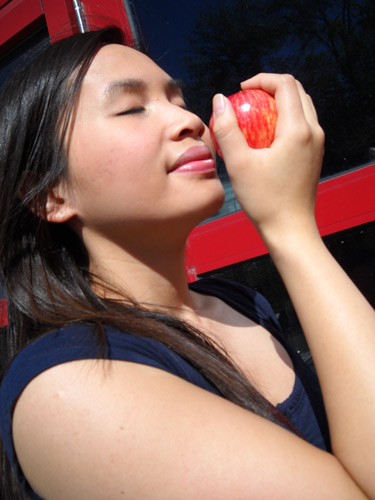
Just the mention of chicken soup is enough for many of us to “smell” and “taste” the broth. But for some people with Alzheimer’s disease, it’s a challenge to remember those sensations and experience them anew — let alone act on those cues by eating properly.
Helping elderly people with Alzheimer’s disease maintain healthful eating habits is the goal of research by U of G undergraduate Nila Ilhamto. Working with food scientist Lisa Duizer in Guelph’s Food Sensory Lab, Ilhamto has looked at how the senses of smell and taste decline with age, particularly during the early stages of Alzheimer’s disease.
“I’m interested in what happens as you age and what’s different in people with Alzheimer’s beyond that,” says Ilhamto, who is studying biological science with a neuroscience minor.
For her undergrad research project, she looked at smell and taste recognition in different groups: healthy people aged 18 to 40 and two groups aged 60 to 85, some with Alzheimer’s disease, some without.
She knew that adults in early stages of the disease could detect scents well enough but had trouble identifying them. That suggested a problem not with olfactory receptors but with information processing, perhaps related to the plaques and tangles that develop in the brain as hallmarks of the disease.
“It’s not the intensity of smell that changes but recognition,” says Ilhamto, whose grandmother developed Alzheimer’s a few years ago. “She has trouble eating sometimes.”
Ilhamto also wanted to look at the related sense of taste. Her younger subjects visited the sensory lab for testing. Taste testing involves rubbing the tongue with prepared taste strips and asking subjects to identify sweet, sour, salty and bitter. They also smell “sniffin’ sticks” resembling magic markers with variously scented tips and identify the scent from a picture chart of possibilities. For the two groups of elderly subjects, Ilhamto took the test kits to retirement homes and private homes. She contacted the Alzheimer’s Society of Guelph-Wellington to help find subjects.
Her results mirrored the findings of other researchers. Normal aging brings a decline in taste and smell, with a more marked decline in people with Alzheimer’s. Even in people without the disease, however, results can vary. The ability to perceive bitter and sour tastes declines more with age, for instance, than the perception of sweet and salty.
Reduced acuity for taste and smell may affect nutrition and health in older adults, and that’s a concern to Duizer. She says: “With aging, eating well is important.”
Her research involves evaluating soy bread as a protein source that’s easy for older adults to eat. Among the professor’s other projects is a proposal to study pureed foods for older adults who have difficulty swallowing.
The food sensory lab opened in spring 2009 within U of G’s Human Nutraceutical Research Unit. In the lab, Duizer works with taste panellists to test numerous characteristics of foods, a vital service for manufacturers looking to gauge reaction to new products.
“You can make the best product in the world, but if people don’t like its sensory properties, they’re just not going to buy it,” she says, adding that only a few scientists study the sensory properties of food products for older consumers.
There are several Guelph researchers, however, who belong to a research group called Agri-Food for Healthy Aging, which is considering diet, nutrition and disease in older adults. They include Duizer, and Profs. Alison Duncan, Human Health and Nutritional Sciences, and Heather Keller, Family Relations and Applied Nutrition. The group also has members at the University of Waterloo and at the Schlegel-UW Research Institute for Aging in Waterloo.